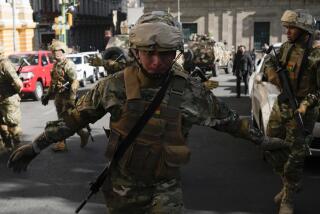Regional summit calls on Bolivians to avoid strife
- Share via
SANTA CRUZ, BOLIVIA — Leaders of nine South American nations called Monday for Bolivians to “take all actions necessary” to help calm the domestic turmoil threatening to split this fractured Andean country apart.
The hastily arranged summit, held in the Chilean capital, Santiago, underscored widespread fears that political violence in Bolivia could erupt into civil war.
The presidents expressed strong support for President Evo Morales and called for an end to violence that could break up the country.
But it was unclear what effect the meeting might have.
Not represented at the session was the Bolivian opposition, which has repeatedly accused Morales of ignoring calls for reconciliation.
Both sides in the conflict said talks between the government and the opposition in the administrative capital, La Paz, were making some progress. However, the talks thus far have focused on laying groundwork for future negotiations.
“I would say we’re headed down a good path,” said Mario Cossio, chief opposition negotiator and the governor of Tarija province, one of five of Bolivia’s nine states aligned against Morales.
The central government has lost control over much of the country, as protesters have sacked government buildings, blocked roads, shut down airports and targeted natural gas pipelines.
Pro-Morales protesters, meanwhile, were blocking entrances to the eastern city of Santa Cruz, causing fuel shortages.
Opposition regions are demanding greater autonomy from the central government and a larger share of national energy revenues. Morales has denounced his foes as “fascists,” “oligarchs” and coup-minded “separatists.”
On Monday, the Bolivian government said it planned to press genocide charges against the opposition governor of Pando province, where the government said more than two dozen people were killed in clashes last week. Gov. Leopoldo Fernandez has denied the allegations and blamed government provocation for the deaths.
Opposition leaders have vowed to support Fernandez. The legal move against him could exacerbate tensions.
Among the chiefs of state in attendance in Santiago were Morales and his close ally, Venezuela’s Hugo Chavez, who have both accused the Bush administration of plotting a coup to oust Morales.
Upon landing in Santiago, Chavez charged that a conspiracy “paid for and directed by the North American empire” had been hatched to oust Morales.
Before Monday’s meeting in Santiago, Chavez compared the situation in Bolivia to the scenario 35 years ago in Chile. A military coup in September 1973 ousted leftist President Salvador Allende, a fierce foe of the Nixon administration, ushering in a 17-year military dictatorship.
Both Bolivia and Venezuela expelled their respective U.S. ambassadors last week, accusing Washington of trying to topple the two South American presidents. The State Department has denied the charges.
But also present in Santiago were Brazil’s Luiz Inacio Lula da Silva and Chile’s Michelle Bachelet, pragmatic leftists who have nurtured strong ties with Washington.
Lula was expected to play a major role: Brazil is a huge investor in Bolivia and the country’s biggest customer for natural gas, Bolivia’s most profitable export. Lula has publicly called on Morales to open a dialogue with opponents.
--
More to Read
Sign up for Essential California
The most important California stories and recommendations in your inbox every morning.
You may occasionally receive promotional content from the Los Angeles Times.













